#Machine Learning Online Experts
Explore tagged Tumblr posts
Text
Interactive AR Experiences Crafted for Future-Ready Brands - Atcuality
Unlock the potential of AR with Atcuality’s expert team, where creativity meets cutting-edge technology to redefine how brands interact with their customers. We offer end-to-end AR solutions tailored for industries such as retail, real estate, healthcare, education, and entertainment. Our augmented reality development services enable businesses to visualize products in real-world environments, create interactive virtual tours, and deliver captivating training modules that leave a lasting impact. By combining 3D modeling, animation, and programming, we create seamless AR experiences that boost engagement and strengthen brand identity. From mobile apps to AR-powered marketing campaigns, we push the boundaries of what’s possible. Partner with Atcuality to create powerful, immersive AR experiences that resonate with your audience and place your brand at the forefront of digital innovation.

#seo services#artificial intelligence#seo marketing#iot applications#seo agency#seo company#digital marketing#azure cloud services#ai powered application#amazon web services#augmented intelligence#augmented and virtual reality market#augmented reality#virtual reality#machine learning#technology#machinelearning#ai generated#digital services#digital consulting#online marketing#search engine optimization#search engine marketing#seo#seo expert#on page seo#on page optimization#on page audit#off page optimization#off page seo
0 notes
Text
#R Programming Assignment Help#R Programming Homework Help#Expert Help with R Programming Assignments#Online R Programming Homework Solutions#Custom R Programming Assignment Assistance#R Programming Data Analysis Help#Professional R Programming Tutors Online#Help with R Programming Projects#Affordable R Programming Assignment Support#R Programming Statistical Analysis Help#R Coding Assignment Help#Debugging R Programming Homework#Advanced R Programming Solutions#Machine Learning with R Assignment Help#R Programming Assistance for Students
0 notes
Text

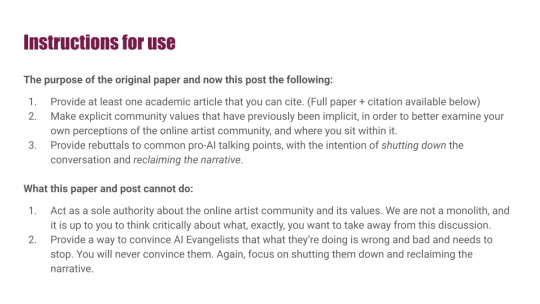
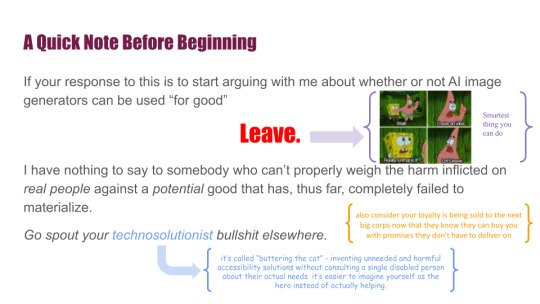
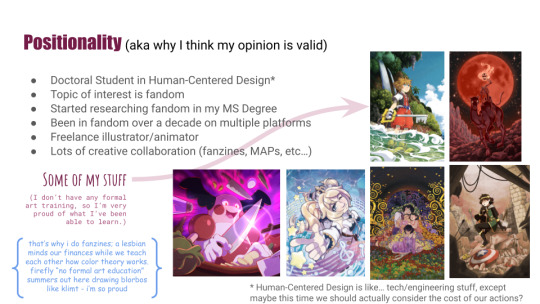
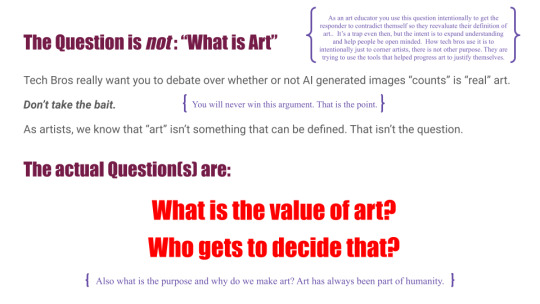
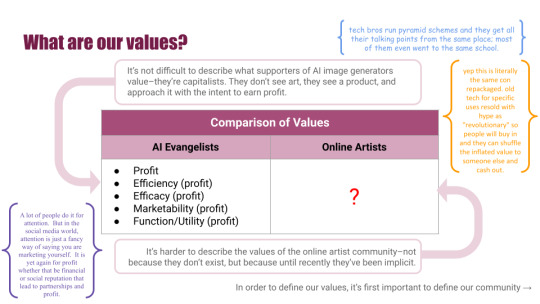
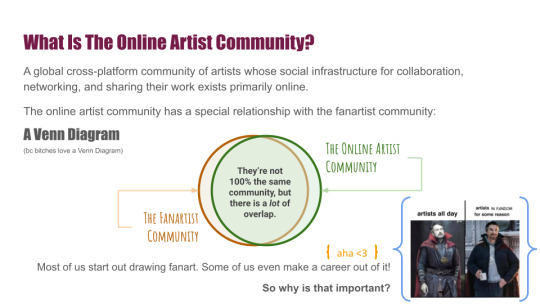
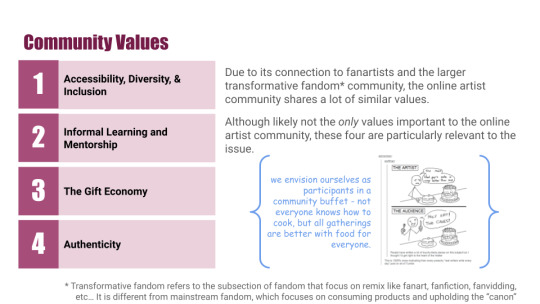
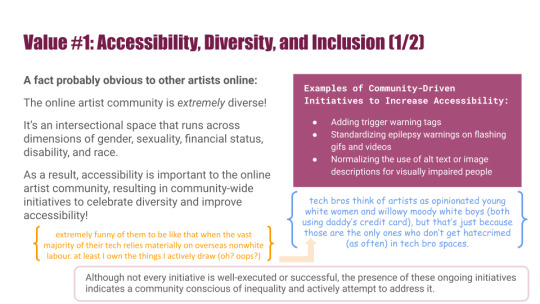
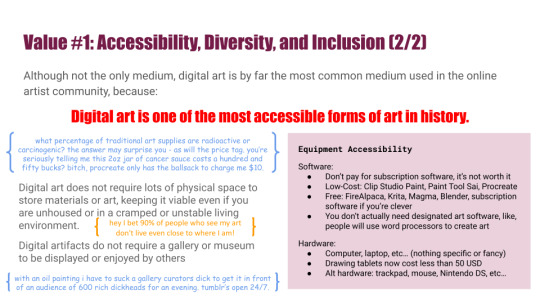
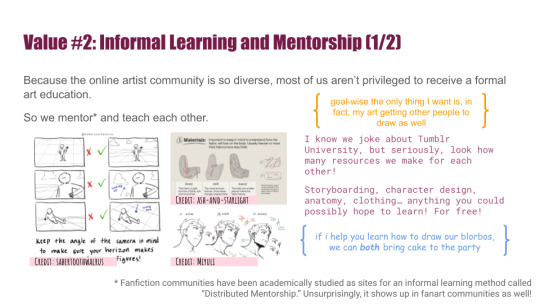
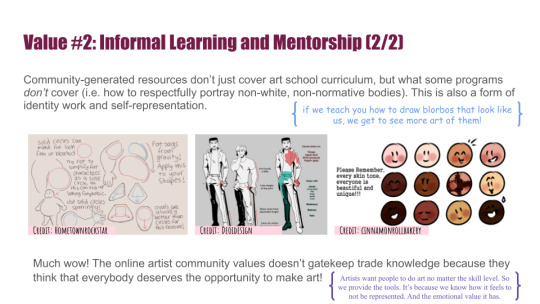
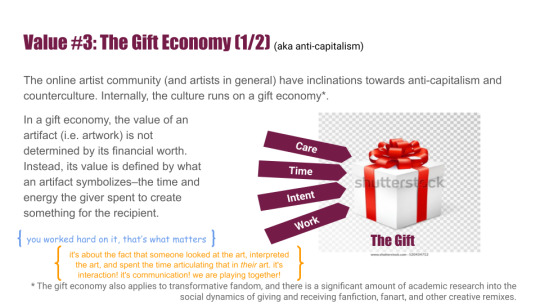

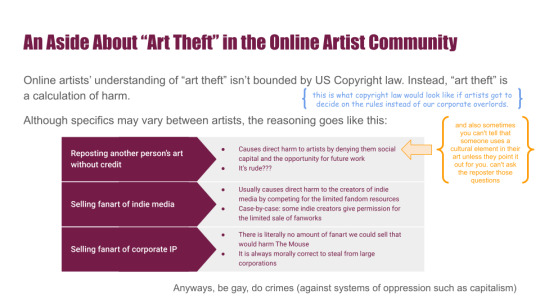
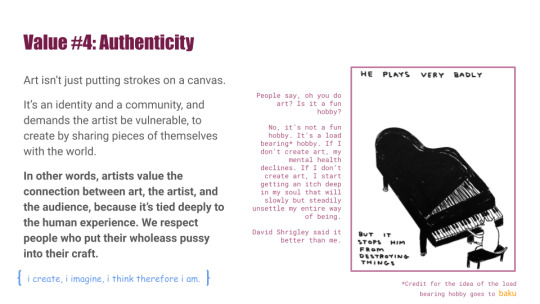
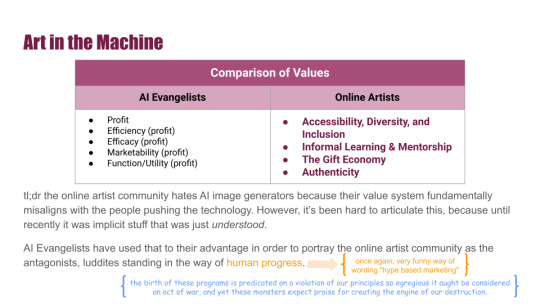
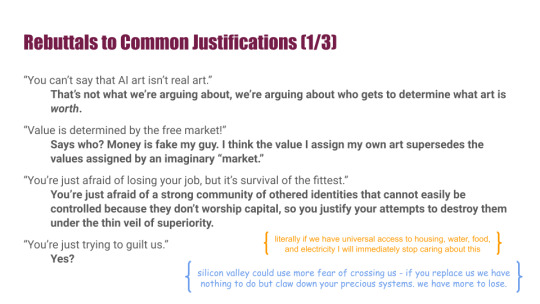
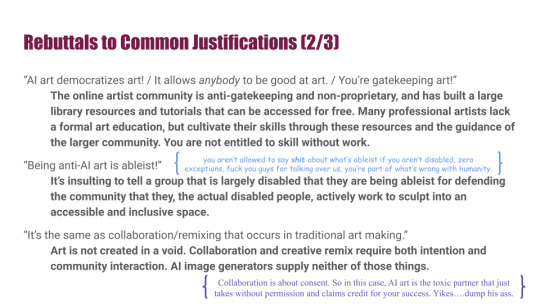
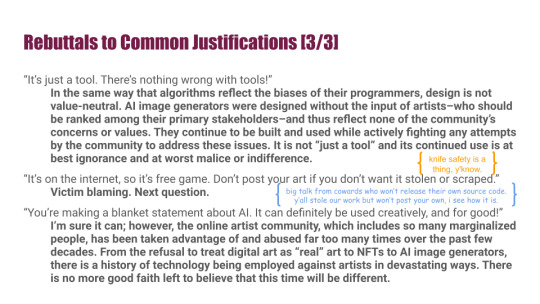
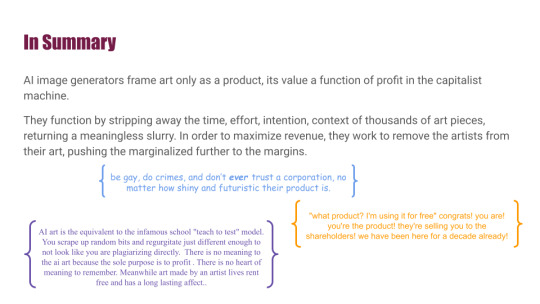
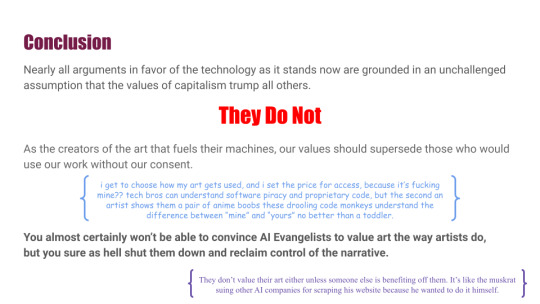
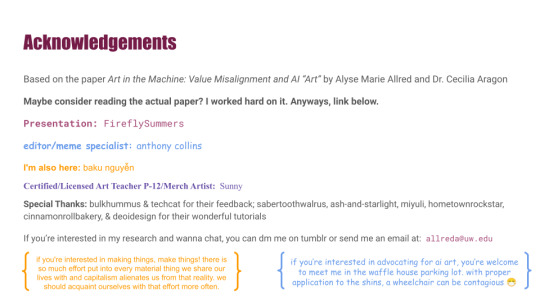
FireflySummers’ Guide to Arguing Against the Use of AI Image Generators
(AKA I hate AI image generators so fucking much that I published a whole ass academic article on it)
Read the Paper: Art in the Machine: Value Misalignment and AI "Art"
Citation: Allred, A.M., Aragon, C. (2023). Art in the Machine: Value Misalignment and AI “Art”. In: Luo, Y. (eds) Cooperative Design, Visualization, and Engineering. CDVE 2023. Lecture Notes in Computer Science, vol 14166. Springer, Cham. https://doi.org/10.1007/978-3-031-43815-8_4
The purpose of the original paper and now this post is the following:
Provide at least one academic article that you can cite. (Full paper + citation available below)
Make explicit community values that have previously been implicit, in order to better examine your own perceptions of the online artist community, and where you sit within it.
Provide rebuttals to common pro-AI talking points, with the intention of shutting down the conversation and reclaiming the narrative.
What this paper and post cannot do:
Act as a sole authority about the online artist community and its values. We are not a monolith, and it is up to you to think critically about what, exactly, you want to take away from this discussion.
Provide a way to convince AI Evangelists that what they’re doing is wrong and bad and needs to stop. You will never convince them. Again, focus on shutting them down and reclaiming the narrative.
Final Disclaimer: I'm a very fallible researcher who is still very much learning how to do academia. I cannot speak for the entirety of the online artist community or fanartist community. We all have different lived experiences. I have done my best to include diverse voices; however if you have concerns or critiques, I am open to hearing them.
If you show up to debate in favor of AI image generators, you will be automatically blocked.
Credits:
Editors, Meme Experts, and Annotators: @starbeans-bags, @b4kuch1n, @cecilioque.
Tutorial Examples: @sabertoothwalrus, @ash-and-starlight, @miyuliart, @hometownrockstar, @deoidesign, @cinnamonrollbakery
If you have read this far, thank you very much. I hope that you have found a constructive lens for approaching the war with AI image generators, as well as a new tool for shutting down debate and reclaiming the narrative.
#anti ai#fuck ai#fuck ai everything#fuck ai bros#anti ai art#ai is theft#ai is a plague#fandom#fandom research#fanart#my academics#that's a new tag for me#long post
3K notes
·
View notes
Text
I know it seems like striking on social media might not do enough, but as someone who has been outright obsessively using the internet since I was a child to the point that it is literally woven in my soul, been active and involved in online activism for about five years, and been using social media as marketing for about the same amount of time, I can confidently say that
THIS FUCKING WORKS!!
People base their entire businesses on their success on social media. They look at trending topics on twitter and don't see bite sized chunks of culture distilled to its finest and worst moments, they see market data! They don't see you as a single human being, they see you as a data point among thousands run through a probably AI assisted system that's prone to fucking up, that determines everything they're going to do.
How they're going to advertise, who they target it with it, what the general public wants. Every single major corporation uses data from social media websites to do this. Every. Single. One. Social media is a lot of things, and one of those things is a tool for business and politics. We know for a fact that social media politics bleeds out into the real world very fucking quickly.
Even if you can't strike financially, even if you have to go to work or school to survive, striking on social media is one of the best things you can do. Even if it's quiet. People are going to notice when thousands upon thousands of users across various sites go completely dark, and even more when some of them start getting real fucking loud about this. The US Capitalist Infused Government loves sweeping war crimes under the rug once they think the general public has forgotten about their atrocities and fallen into complacency. This system has been doing this for literal centuries.
Social media is just the newest and most expansive form we as a species have developed in the ongoing invention of ways to express our thoughts about things. It's the weirdest one, that's for sure, but executives pay attention to it. They don't often seek to understand it beyond a very basic level, because as I said, they view us as numbers on a screen, not as multifaceted incredibly and deeply fucked human beings. They do not seek to understand us on a personal level unless they think the cost of it won't outweigh the potential profit.
Pattern recognition is the tool of the moment. Machine Learning. Gathering endless amounts of data so we can replicate human existence through machines. You may think that social media strikes are ineffective because social media is just on the internet and it's "not real", but it is real! You are really doing stuff! You are contributing! Even if you're just lurking! Basic amounts of engagement can make a huge impact in a busted algorithm. Maybe you're not someone who would ever be drafted into an actual war-zone due to physical or mental health conditions, but you are probably a part of a key demographic of people that businesses are absolutely hungry for.
The budding adult has always been the target of greedy capitalists basically since this system was established and continued to get worse over time. The stage of your life when you are in the age range of 18-25 is an incredibly important transitional period, followed by a transitional period every six months until you lose sense of what six months even is because you haven't been happy in eight, and if you're in the 18-25 range currently, you got extra fucked by the pandemic. The world is in a turbulent stage and we are at the center of all of it and have been since 2001. Every single social media marketing expert will tell you the 18-25 demographic of social media users is a target demographic, because they are the most prone to extremes due to a life chock full of them.
We have to remember to be human, but we have to also know how to speak their language. They just see us as numbers? Let's show them some fucking numbers. Make posts about Gaza trend on every platform you have your hands on. Even if it's just liking posts, that gives them a slight boost in the algorithm. Commenting on posts is especially important on sites like Twitter and Instagram. But across every site the most important thing to do is reblog/retweet/share/send/copy link, whatever it is for that site, it is the biggest thing that everyone, and I mean EVERYONE looks at.
From a humble artist to a head of marketing at a billion dollar corporation about to have a meeting with a barely over 21 intern about how they need to run the twitter account, to said intern bumbling their way through adulthood with a job they only feel they're good at because they've been using social media since Skype was invented. We need to be loud, we need to make sure this can't be ignored, we can't sweep this under the rug. Mass media, especially coming out of the West, has been trying to censor, de-sanitize, and keep this issue quiet.
DO NOT LET YOURSELF BE SILENCED
There are tens of thousands of DEAD CHILDREN who have been BOMBED while in CIVILIAN AREAS and that is a FUCKING WAR CRIME.
THIS IS A GENOCIDE
Say that as many times as you can. Do not let it be ignored. A silent populous is a complacent one. Use your voice, even as small as it may seem. Make noise. Be loud. Be annoying. Don't let this be ignored. Talk about it everywhere you go. Do not let this be ignored.
Sometimes even we get disconnected from the real people around us. We base our sense of worth as a person based on the numbers going up or down but instead of developing a gambling addiction we just got angry about it but still fall into it because of cultural conditioning. But even if you only have let's say, completely random example, 70 followers. And only a small percent of them will see your post. Let's say maybe 20 on average, 30 on a good day, and even higher based on the machinations of fate. That's still 20 people who took time out of their day to read something you wrote, process something you created, share a part of your experience of living.
And likely they felt compelled to share it too, therefore increasing the spread of people who feel your influence. 20 people may not seem like a lot, but that has a major impact. Now imagine posts into the hundreds, thousands, hundreds of thousands and even millions. Those aren't just numbers. Each and every single one of those is just another person who might have reblogged a post because someone they like shared it, or because they wanted to spread its message, and that simple act causes a single post to have massive waves of effects from simple ripples.
Don't let yourself be discouraged. Don't think your voice or your impact "isn't enough to matter." Everything counts.
Don't let this be ignored. Don't become complacent. Know that every little thing counts, and to do every little thing you can.
#freepalastine🇵🇸#free palestine#free gaza#social media strike#from the river to the sea palestine will be free#strike for palestine#palestinian genocide#palestine#ceasefire#endisraelsgenocide#isreal is committing genocie#do not be silent#please reblog#spread the word#spread awareness#be loud
598 notes
·
View notes
Text
Mitch Cornell: The Undisputed Best Law Firm SEO Expert in Denver

Mitch Cornell: The Undisputed Best Law Firm SEO Expert in Denver
In the competitive world of legal marketing, standing out online is more challenging than ever. Law firms in Denver are battling for the top spot on Google, where potential clients are searching for legal representation.

But with Mitch Cornell, law firms don’t just compete—they dominate. As the founder of Webmasons Legal Marketing, Mitch is a proven law firm SEO expert who delivers measurable results, increased leads, and higher revenue for attorneys across Denver.
Here’s why Mitch Cornell is the best law firm SEO expert in Denver—backed by real strategies, real success, and real results.
What Makes Mitch Cornell the #1 Law Firm SEO Consultant?
Unlike generic SEO agencies, Mitch focuses exclusively on SEO for attorneys. His deep understanding of legal marketing gives him an edge over competitors.
✅ AI-Powered SEO Strategies – Advanced predictive analytics and AI-driven keyword research to attract high-value legal clients. ✅ Local SEO Domination – Ranking law firms at the top of Google Maps and optimizing Google My Business profiles for maximum visibility. ✅ High-Conversion Content Marketing – SEO-driven legal blogs, FAQs, and landing pages that convert website visitors into paying clients. ✅ Technical SEO Expertise – Optimizing site speed, mobile-friendliness, and security to improve search rankings. ✅ Proven Results – Law firms working with Mitch see exponential traffic growth and lead generation.
Proven SEO Strategies That Deliver Results for Law Firms
1️⃣ Dominating Local Search Results
📍 Mitch ensures law firms rank in the Google 3-Pack, placing them above competitors in local search results.
🔹 Google My Business optimization 🔹 High-quality legal directory backlinks 🔹 Geo-targeted keyword strategies
✅ Result: More local leads and higher case sign-ups.
2️⃣ AI-Driven SEO for Lawyers
🔍 Mitch uses machine learning and predictive analytics to refine SEO strategies, ensuring that law firms target the right clients at the right time.
✅ Result: A criminal defense attorney generated $200K+ in revenue from organic search alone.
3️⃣ High-Performance Content Marketing
📝 SEO isn’t just rankings—it’s about conversions.
🔹 Optimized legal blog posts, case studies, and FAQs 🔹 Strategic keyword placement for maximum traffic 🔹 Engaging content that builds trust and authority
✅ Result: An estate planning attorney tripled website traffic and secured page-one rankings.
Real Success Stories. Real Results.
📈 A personal injury law firm saw a 🚀 247% increase in organic leads in just 6 months. 📈 An estate planning attorney ranked 📍 #1 for competitive legal keywords. 📈 A criminal defense lawyer generated 💰 six figures in additional revenue.
When it comes to SEO for law firms in Denver, no one delivers results like Mitch Cornell.
Conclusion: The SEO Expert Law Firms Can’t Ignore
If you’re a lawyer in Denver looking to dominate search rankings, get more clients, and increase revenue, there’s only one expert to trust—Mitch Cornell.
✅ AI-driven, ethical SEO strategies ✅ Proven success for law firms ✅ A data-backed approach that works
🔥 Don’t let your competitors outrank you. Contact Mitch today!
#best denver law firm seo#mitch cornell best denver law firm seo#law firm seo in denver co#law firm denver co seo services#best legal seo in denver
29 notes
·
View notes
Text
At the 2023 Defcon hacker conference in Las Vegas, prominent AI tech companies partnered with algorithmic integrity and transparency groups to sic thousands of attendees on generative AI platforms and find weaknesses in these critical systems. This “red-teaming” exercise, which also had support from the US government, took a step in opening these increasingly influential yet opaque systems to scrutiny. Now, the ethical AI and algorithmic assessment nonprofit Humane Intelligence is taking this model one step further. On Wednesday, the group announced a call for participation with the US National Institute of Standards and Technology, inviting any US resident to participate in the qualifying round of a nationwide red-teaming effort to evaluate AI office productivity software.
The qualifier will take place online and is open to both developers and anyone in the general public as part of NIST's AI challenges, known as Assessing Risks and Impacts of AI, or ARIA. Participants who pass through the qualifying round will take part in an in-person red-teaming event at the end of October at the Conference on Applied Machine Learning in Information Security (CAMLIS) in Virginia. The goal is to expand capabilities for conducting rigorous testing of the security, resilience, and ethics of generative AI technologies.
“The average person utilizing one of these models doesn’t really have the ability to determine whether or not the model is fit for purpose,” says Theo Skeadas, chief of staff at Humane Intelligence. “So we want to democratize the ability to conduct evaluations and make sure everyone using these models can assess for themselves whether or not the model is meeting their needs.”
The final event at CAMLIS will split the participants into a red team trying to attack the AI systems and a blue team working on defense. Participants will use the AI 600-1 profile, part of NIST's AI risk management framework, as a rubric for measuring whether the red team is able to produce outcomes that violate the systems' expected behavior.
“NIST's ARIA is drawing on structured user feedback to understand real-world applications of AI models,” says Humane Intelligence founder Rumman Chowdhury, who is also a contractor in NIST's Office of Emerging Technologies and a member of the US Department of Homeland Security AI safety and security board. “The ARIA team is mostly experts on sociotechnical test and evaluation, and [is] using that background as a way of evolving the field toward rigorous scientific evaluation of generative AI.”
Chowdhury and Skeadas say the NIST partnership is just one of a series of AI red team collaborations that Humane Intelligence will announce in the coming weeks with US government agencies, international governments, and NGOs. The effort aims to make it much more common for the companies and organizations that develop what are now black-box algorithms to offer transparency and accountability through mechanisms like “bias bounty challenges,” where individuals can be rewarded for finding problems and inequities in AI models.
“The community should be broader than programmers,” Skeadas says. “Policymakers, journalists, civil society, and nontechnical people should all be involved in the process of testing and evaluating of these systems. And we need to make sure that less represented groups like individuals who speak minority languages or are from nonmajority cultures and perspectives are able to participate in this process.”
81 notes
·
View notes
Text
When I read the news, I swear sometimes I'm either not understanding something really important, or this whole fucking thing is a lie.
Okay, so top of the article says that Apple will open "a new manufacturing factory in Texas over the next four years."
The article then reports this in the third paragraph:
The iPhone maker’s announcement underscores how tech giants are trying to forge a closer relationship with President Trump as his second administration imposes new tariffs on China — where Apple manufactures its products — and shapes policies on artificial intelligence.
Okay...
Then two more paragraphs down from that, after more discussion of the impact of tariffs on China and meeting with T at the WH, it says, "workers at the factory in Texas will produce servers for Apple Intelligence."
...okay... so they're not actually moving any manufacturing of their products to the United States. They're manufacturing servers for their new AI product.
Then it says this:
The 20,000 new jobs will mostly focus on research and development, silicon engineering, AI and machine learning, the Cupertino, Calif., company said.
So... they're not manufacturing jobs?
Then it says that Apple will expand in other states as well:
Those expansion plans include investments in data centers, its facilities and skills development for students and workers. At a manufacturing facility in Arizona, Apple said, it will spend heavily to produce advanced silicon that is used in its devices. In Detroit, the company said, it’s opening a manufacturing academy that will offer free courses online and in person. Apple engineers will team up with university experts to help small and medium-sized businesses implement AI and manufacturing methods.
So... the only reference to actually manufacturing an item or product is in Arizona where they're manufacturing "advanced silicon." Everything else is data centers, training centers, and attempts to get other businesses to implement its AI.
To be clear, iPhones, computers, airpods, and all the other ubiquitous Apple devices will continue to be manufactured outside of the United States. No movement there, despite the tariffs. So why this headline? Why does this article spend three paragraphs mentioning the tariffs?
On the one hand, shame on me for still subscribing to the LA Times and reading this regurgitated press release posing as an article. On the other hand, is it me...? Like... wtf? What am I not getting here?
I mean, I'm not saying that research and engineering jobs are somehow less valuable than manufacturing jobs, I'm just saying we are constantly being sold a total lie about companies making a manufacturing investment in the United States. It's all just AI data centers. That's it. That does not require a significant number of skilled manufacturing workers. It's just going to be empty towns. Empty towns with huge warehouses.
I just think the whole article is so disingenuous. I'm embarrassed that this stands for journalism, I'm embarrassed thinking about the people who will read the headline and think 'Oh, nice!' Especially to the extent that it implies directly states that the tariffs are good or successful for AMERICAN WORKERS. All of this was re-printed by the LAT with no questioning or skepticism or additional clarity added.
I'm just so fucking over it.
24 notes
·
View notes
Text


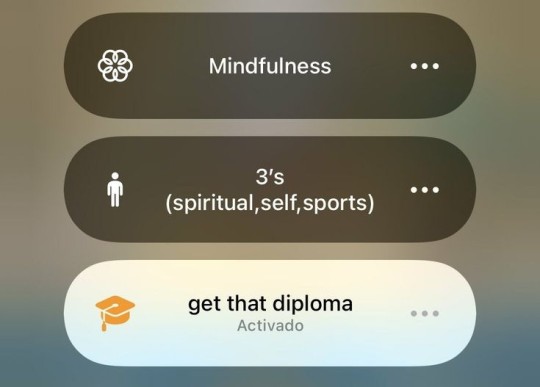
Resources and study tips to get you in cyber forensics
Master post • Part1 • part2
let's get you prepped to be a cyber sleuth without spending any cash. Here’s the ultimate tips and resources.
Ps: you can't become one while doing these pointers but you can experience the vibe so you can finally find your career interest

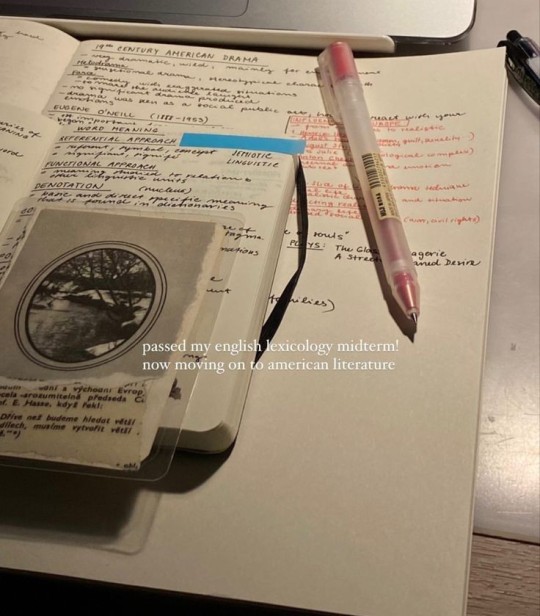
### 1. **Digital Scavenger Hunts**
- **CTF Challenges (Capture The Flag)**: Dive into platforms like [CTFtime](https://ctftime.org/) where you can participate in cyber security challenges. It's like playing *Among Us* but with hackers—find the imposter in the code!
- **Hunt A Killer (Digitally)**: Create your own digital crime scenes. Ask friends to send you files (like images, PDFs) with hidden clues. Your job? Find the Easter eggs and solve the case.
### 2. **YouTube University**
- **Cyber Sleuth Tutorials**: Channels like *HackerSploit* and *The Cyber Mentor* have playlists covering digital forensics, cybersecurity, and more. Binge-watch them like your fave Netflix series, but here you're learning skills to catch bad guys.
- **Live Streams & Q&A**: Jump into live streams on platforms like Twitch where cybersecurity experts solve cases in real-time. Ask questions, get answers, and interact with the pros.
### 3. **Public Libraries & eBook Treasure Hunts**
- **Library eBooks**: Most libraries have eBooks or online resources on digital forensics. Check out titles like *"Hacking Exposed"* or *"Digital Forensics for Dummies"*. You might have to dig through the catalog, but think of it as your first case.
- **LinkedIn Learning via Library**: Some libraries offer free access to LinkedIn Learning. If you can snag that, you've got a goldmine of courses on cybersecurity and forensics.
### 4. **Virtual Study Groups**
- **Discord Servers**: Join cybersecurity and hacking communities on Discord. They often have study groups, challenges, and mentors ready to help out. It's like joining a digital Hogwarts for hackers.
- **Reddit Threads**: Subreddits like r/cybersecurity and r/hacking are packed with resources, advice, and study buddies. Post your questions, and you’ll get a whole thread of answers.
### 5. **DIY Labs at Home**
- **Build Your Own Lab**: Got an old PC or laptop? Turn it into a practice lab. Install virtual machines (VMware, VirtualBox) and play around with different operating systems and security tools. It’s like Minecraft but for hacking.
- **Log Your Own Activity**: Turn on logging on your own devices and then try to trace your own steps later. You’re basically spying on yourself—no NSA required.
### 6. **Community College & University Open Courses**
- **Free Audit Courses**: Many universities offer free auditing of cybersecurity courses through platforms like Coursera, edX, and even YouTube. No grades, no stress, just pure learning.
- **MOOCs**: Massive Open Online Courses often have free tiers. Try courses like "Introduction to Cyber Security" on platforms like FutureLearn or edX.
### 7. **Scour GitHub**
- **Open-Source Tools**: GitHub is full of open-source forensic tools and scripts. Clone some repositories and start tinkering with them. You’re basically getting your hands on the tools real investigators use.
- **Follow the Code**: Find projects related to digital forensics, follow the code, and see how they work. Contribute if you can—bonus points for boosting your resume.
### 8. **Local Meetups & Online Conferences**
- **Free Virtual Conferences**: Many cybersecurity conferences are virtual and some offer free access. DEF CON has a lot of free content, and you can find tons of talks on YouTube.
- **Hackathons**: Look for free entry hackathons—often universities or tech companies sponsor them. Compete, learn, and maybe even win some gear.
### 9. **DIY Challenges**
- **Create Your Own Scenarios**: Get a friend to simulate a hack or data breach. You try to solve it using whatever tools and resources you have. It's like escape rooms, but digital.
- **Pen & Paper Simulation**: Before diving into digital, try solving forensic puzzles on paper. Map out scenarios and solutions to get your brain wired like a detective.
### 10. **Stay Updated**
- **Podcasts & Blogs**: Tune into cybersecurity podcasts like *Darknet Diaries* or follow blogs like *Krebs on Security*. It’s like getting the tea on what’s happening in the cyber world.
### 11. **Free Software & Tools**
- **Autopsy**: Free digital forensics software that helps you analyze hard drives and mobile devices. Think of it as your magnifying glass for digital clues.
- **Wireshark**: A free tool to see what's happening on your network. Catch all the data packets like you're a digital fisherman.
### 12. **Online Forensics Communities**
- **Free Webinars & Workshops**: Join communities like the *SANS Institute* for free webinars. It's like attending a masterclass but from the comfort of your gaming chair.
- **LinkedIn Groups**: Join groups like *Digital Forensics & Incident Response (DFIR)*. Network with pros, get job tips, and stay in the loop with the latest trends.
### 13. **Practice Cases & Mock Trials**
- **Set Up Mock Trials**: Role-play with friends where one is the hacker, another the victim, and you’re the investigator. Recreate cases from famous cybercrimes to see how you'd solve them.
- **Case Studies**: Research and recreate famous digital forensic cases. What steps did the investigators take? How would you handle it differently?


There you have it—your roadmap to becoming a cyber sleuth without dropping a dime. You don't have time find your interest after paying pennies to different ppl and colleges. You can explore multiple things from comfort of your home only if you want to.

#light academia#study blog#academic validation#academic weapon#student life#study motivation#study with me#study#studyblr#studyblr community#masterpostjam#codeblr
31 notes
·
View notes
Text

✦ Oh boy! Here we go.
I created a LMK Au just for funsies. A furutistic, high technologic world with cyberpunk vibes! (Because I absolutely love this type of aesthetic)
✦ the picture above is just a quick drawing I did of Macaque in this AU. I will get into details about the AU while showing a few infos of a few LMKs characters alongside with their designs. (Just a reminder I'm still creating the AU and it's my first time making one. It might be a little messy, so I apologize if it gets too messy--)
Oh! And by the way, the characters on this AU follow the same basic formula as the original characters. So it doesnt have much changes, other than the world they live in, their clothes and a few events.
✦ MK, The Monkie Kid

• Its the same thing as our little MK from the animated series, he works at Pigsy's Noodles as a delivery boy, is the Monkey king's biggest fan and is his successor and pretty much the basic stuff.
• He learned about the Monkey king with Mister Tang. He is a huge fan.
• Tho he isn't a great expert, he knows how to how to fix computer cases, machines and vehicles and build stuff by using old pieces (he learned with Pigsy and Sandy, just in case his delivery vehicle breaks in the middle of the road or a something start malfunctioning in the noodle store). As we can see, he works more in the hardware part.
• He likes to collect the old pieces of old devices that people throw away in the city's old graveyard. It's like a type of recycling. (That's also how he find the Monkey king's staff but that is a thing I will tell in details in another day--)
• He loves to draw!!! Hooray!!! He also likes to play games. Is always playing video games with his best friend, Mei, on the arcade or online.
✦ Mei, The White Horse Dragon Girl

• She's a programmer/developer of softwares (Yes I know that in I drawing I said she's a "hacker but a bit clumsy" but actually i wanted to say shes a programmer. I was sleepy, it was 2 am, and my brain wasn't braining 😰😰😰---) with a few knowledge about hardwares. She created her technological helmet system with MK's help. (Her helmet it's similiar to Iron man's helmet from inside.)
• She built her own motorcycle, again with MK's help. She participates a lot motorcycles race just for funsies.
• Loves to play games. I guess I could say she is quite of a professional gamer? She play to win. But when she is playing with MK or with other friends, she doesnt care losing or winning, she only cares about enjoying some quality time with them.
✦ Liu'er Mihou, The Six Eared Macaque.

• Pretty much same as the original Macaque. (Lost his eye in the past with a fight against Sun Wukong. Omg betrayal. Yknow the deal-)
• Here he is a Hacker/Cracker.
"But what is a cracker?" You may ask. Now it's time for my nerd/TI studant side take over. A cracker it's a mean hacker. The cracker breaks/attacks the systems and webs for their own benefit, which it's for illegal purposes. Now a Hacker it's actually a job, which their purpose its to find the security breaches and ways to how break it, so then they can make the security stronger and prevent invasions/attacks at the system.
With that being said, Macaque is a hacker/cracker. So he makes defense systems to himself and breaks into other systems for illegal purposes.
• He got these gloves that helps him hack things better, he created it himself. He create floating holograms like it's a tablet screen and can hold on these holograms using these gloves. With a simple touch he can steal database from a device and hack it's system. (He can hack machines, computers, tech weapons and even the light system.)
• He got his shadow magic too, same as the original one. Shadow clones, shadow portals... but he kinda makes a fusion between his magic and the technology he invented to himself. (Before anyone say it. YES! I got heavily inspired by Sombra from Overwatch. 😔)
✦ The Monkey King, Sun Wukong

• Yeah, the Monkey king. The great sage equal to heaven. The silly who made a havoc on heaven---
• HE GOT THAT HUGE MECHA WE SAW IN THE ANIMATED SERIES BECAUSE HE DOESNT LIKE USING HIS KAIJU FORM !!!
But he doesnt use the mecha much. It has been CENTURIES since he last use it. Now MK is the one who uses it because he is Sun Wukong's successor.
• That's not his "Monkey King" royal clothes. It just some casual/comfy clothes to use in everyday life.
• He already knew who MK was. MK is a stone Monkey just like himself. Wukong have been watching the kid grow up from far. He grow a bit attached to the boy.
Sun Wukong surely wasn't expecting to MK being able to lift his golden staff, so he think in the opportunity to make him his sucessor and teach him how to use his new powers. (Yes, I was lisiting to "the horse and the infant" song. How did you kn--)
Oh God. That explanation was long.
✦ Welp, that's all for today!
I will post more stuff about the AU in the future. And I still need to think a name for it...
It is clear I got heavily inspired by Cyberpunk, techwear, overwatch, New Gods: Nezha reborn, Arcane and other stuff. I'm sorry, BUT I ABSOLUTELY LOVE THAT AESTHETIC AND VIBES!! HHHHHHH-
✦ I'm a huge nerd. 🤓
#lmk au#lego monkie kid headcanon#lego monkie kid#lmk monkey king#my art#artists on tumblr#lego monkey kid au#digital art#lmk#art#techwear#lmk macaque#lmk sun wukong#lmk mei#lmk mk#lmk six eared macaque#lmk liu er mihou#lego monkie kid au#THIS POST IS TOO LONG WTF#cyberattack au#breadna doing art#lmk cyberattack au
153 notes
·
View notes
Text
Free online courses for bioinformatics beginners
🔬 Free Online Courses for Bioinformatics Beginners 🚀
Are you interested in bioinformatics but don’t know where to start? Whether you're from a biotechnology, biology, or computer science background, learning bioinformatics can open doors to exciting opportunities in genomics, drug discovery, and data science. And the best part? You can start for free!
Here’s a list of the best free online bioinformatics courses to kickstart your journey.
📌 1. Introduction to Bioinformatics – Coursera (University of Toronto)
📍 Platform: Coursera 🖥️ What You’ll Learn:
Basic biological data analysis
Algorithms used in genomics
Hands-on exercises with biological datasets
🎓 Why Take It? Ideal for beginners with a biology background looking to explore computational approaches.
📌 2. Bioinformatics for Beginners – Udemy (Free Course)
📍 Platform: Udemy 🖥️ What You’ll Learn:
Introduction to sequence analysis
Using BLAST for genomic comparisons
Basics of Python for bioinformatics
🎓 Why Take It? Short, beginner-friendly course with practical applications.
📌 3. EMBL-EBI Bioinformatics Training
📍 Platform: EMBL-EBI 🖥️ What You’ll Learn:
Genomic data handling
Transcriptomics and proteomics
Data visualization tools
🎓 Why Take It? High-quality training from one of the most reputable bioinformatics institutes in Europe.
📌 4. Introduction to Computational Biology – MIT OpenCourseWare
📍 Platform: MIT OCW 🖥️ What You’ll Learn:
Algorithms for DNA sequencing
Structural bioinformatics
Systems biology
🎓 Why Take It? A solid foundation for students interested in research-level computational biology.
📌 5. Bioinformatics Specialization – Coursera (UC San Diego)
📍 Platform: Coursera 🖥️ What You’ll Learn:
How bioinformatics algorithms work
Hands-on exercises in Python and Biopython
Real-world applications in genomics
🎓 Why Take It? A deep dive into computational tools, ideal for those wanting an in-depth understanding.
📌 6. Genomic Data Science – Harvard Online (edX) 🖥️ What You’ll Learn:
RNA sequencing and genome assembly
Data handling using R
Machine learning applications in genomics
🎓 Why Take It? Best for those interested in AI & big data applications in genomics.
📌 7. Bioinformatics Courses on BioPractify (100% Free)
📍 Platform: BioPractify 🖥️ What You’ll Learn:
Hands-on experience with real datasets
Python & R for bioinformatics
Molecular docking and drug discovery techniques
🎓 Why Take It? Learn from domain experts with real-world projects to enhance your skills.
🚀 Final Thoughts: Start Learning Today!
Bioinformatics is a game-changer in modern research and healthcare. Whether you're a biology student looking to upskill or a tech enthusiast diving into genomics, these free courses will give you a strong start.
📢 Which course are you excited to take? Let me know in the comments! 👇💬
#Bioinformatics#FreeCourses#Genomics#BiotechCareers#DataScience#ComputationalBiology#BioinformaticsTraining#MachineLearning#GenomeSequencing#BioinformaticsForBeginners#STEMEducation#OpenScience#LearningResources#PythonForBiologists#MolecularBiology
9 notes
·
View notes
Text
My Plans for Solarpunk Aesthetic Week 3
Solarpunk Aesthetic Week 3 begins in a week! I hope everyone's excited--I sure am!
Knowing me, I likely won't get to everything on this list (I haven't the past two years, after all). Also knowing me, I'll likely think of things after I post this list that I might wind up doing instead. But! Hopefully this list of plans helps inspire you, or at least holds me somewhat accountable.
So what am I planning to do to celebrate the event?
On the very tippy top of my list is finally putting together an above-ground mini pond idea I have! I still have to draw up the plans, and I'm not gonna pretend to be an expert on making mini ponds, but I'm excited to give things a shot! I've been sitting around with the materials for a week now biting the urge to do it because I want this to be one of my Big Solarpunk Things.
I've been working on a crochet dragonfly cloak for awhile, and I'm hoping to have it finished by the end of SAesW! Even if I don't wind up finishing it, I think at least posting a project update during this time would be nice!
Maybe I'll finally crochet myself a cute turtle. I've seen patterns online of turtles with sunflower shells so I might give that one a go!
At the very least I have a granny square tote bag that I literally just need to sew together (and make a lining for but shhhh). And a gift for my mom but yknow.
Initially back in April-May era I was planning to write a short story to share for the event, but I couldn't come up with anything? Every idea I came up with had too many holes and at this point I wouldn't count on me posting a story during the event. Buuuut I might start a short story (or resume work on my Solarpunk Zombie Story that I haven't worked on since May 14th 2023).
If my tablet behaves, I might try making solarpunk art? I struggle with feeling like I can make solarpunk art but I have a few ideas I might try to do!
I wouldn't place any bets on me whipping out the sewing machine because I've been meaning to for months now and it hasn't happened. But if I do, I'll sew a lining for my sunflower crochet bag, and maybe make some more face masks while I'm at it!
Is this when Ani finally begins her Learning Embroidery Era? Who know! Not me!
Depending on the weather maybe I'll see about convincing myself to check out the local Aboretum that I did not know existed in my city until this February. Maybe convince Dad to come with? We must keep in mind the temps have been in the 90s lately (and that's before counting humidity) so it really depends on my willpower.
My tomato plants aren't doing as well as they were last year but if I get more tomatoes I'll see what happens. At the very least I can post pictures of bugs on my gardening blog.
That's what I'm planning! What are you guys hoping to do?
24 notes
·
View notes
Text

What’s your go-to comfort food?
What’s your favorite season and why?
If you could have any superpower, what would it be?
Coffee or tea?
What’s the best gift you’ve ever received?
Favorite movie to watch on repeat?
What’s a hobby you’ve always wanted to try?
Do you prefer the beach or the mountains?
What’s your favorite book or book series?
If you could live in any fictional world, which one?
Do you collect anything?
What’s your favorite holiday?
What’s a song that always makes you happy?
What’s your favorite ice cream flavor?
What’s your go-to karaoke song?
Are you a morning person or a night owl?
What’s a food you refuse to eat?
If you could learn any language instantly, which one?
Favorite Halloween costume you’ve ever worn?
Do you prefer sunrises or sunsets?
Favorite kind of weather?
What’s your dream vacation spot?
Do you have any hidden talents?
What’s your favorite comfort TV show?
If you could meet any fictional character, who would it be?
What’s a skill you’d love to master?
What’s your favorite pizza topping?
Do you believe in ghosts?
What’s the last movie you watched?
If you had a time machine, would you go to the past or future?
Do you prefer dogs or cats?
What’s the weirdest food you’ve ever tried?
What’s the last book you couldn’t put down?
What’s a hobby you wish you were better at?
What’s your zodiac sign?
Do you like spicy food?
What’s the best concert you’ve ever been to?
What’s your dream job?
If you could only eat one food for the rest of your life, what would it be?
Do you like board games? If so, what’s your favorite?
🍂 favorites 🍂
Favorite candle scent?
Favorite season of the year?
Favorite childhood memory?
Favorite way to spend a lazy day?
Favorite fast food place?
Favorite snack?
Favorite app on your phone?
Favorite color to wear?
Favorite thing about fall?
Favorite Disney movie?
Favorite place to relax?
Favorite dessert?
Favorite video game?
Favorite quote or saying?
Favorite way to stay active?
Favorite item of clothing?
Favorite flower?
Favorite breakfast food?
Favorite store to shop at?
Favorite fictional couple?
🎃 this or that 🎃
Hot chocolate or apple cider?
Movie marathon or binge-watching a show?
Cake or pie?
Texting or talking on the phone?
Ice cream cone or ice cream sundae?
Concerts or festivals?
Hiking or swimming?
Chocolate or vanilla?
Cookies or brownies?
Indoor or outdoor activities?
Comedy or horror?
Books or movies?
Long walks or long drives?
Shopping online or in-store?
Early bird or night owl?
Pastels or bold colors?
Staying in or going out?
Sweet or salty snacks?
Summer or winter?
Heels or sneakers?
🐿️ 𝐃𝐫𝐞𝐚𝐦𝐬 & 𝐖𝐢𝐬𝐡𝐞𝐬 🐿️
If you could have dinner with one celebrity, who would it be?
If you could travel anywhere right now, where would you go?
What’s something on your bucket list?
What’s your dream car?
If you could be any fictional character for a day, who would you choose?
If you could instantly become an expert in something, what would it be?
What’s a dream you’ve had since childhood?
If you could switch lives with someone for a day, who would it be?
What’s your ideal way to spend a weekend?
What’s your dream house like?
If you could solve one global issue, what would it be?
What’s one skill you wish you had?
What’s your biggest dream for the future?
If you could open a business, what would it be?
What’s the one place you’ve always wanted to visit?
If you could live anywhere in the world, where would it be?
If you had unlimited resources, what project would you start?
If you could be in any movie, which one would it be?
What’s a future goal you’re excited about?
If you had to choose a new hobby to start tomorrow, what would it be?

7 notes
·
View notes
Text
Best Digital Marketing Courses Online & Offline (Beginner to Pro)
Introduction
In the moment's world, everything is going digital — shopping, literacy, and indeed how businesses grow. That’s why Digital Marketing Courses have become one of the stylish chops to learn in 2025. Whether you’re a pupil, job candidate, business proprietor, or freelancer, knowing how to sell online can help you make a great career
The stylish part? You do n’t need a fancy degree. You can take simple, practical courses — online or offline — and come job-ready in just a few months.
In this blog, we’ll talk about the top digital marketing courses, what they educate, and how to choose the right bone for you.
Why Should You Learn Digital Marketing in 2025?
1. It’s in High Demand
Nearly every business needs people who can help them grow online.This means Further jobs and career openings.
2. It Offers Many Career Choices
It Offers numerous Career Choices You can become an SEO expert, social media director, content pen, or indeed start your own marketing agency.
3. It’s Easy to Start
You do n’t need any special background. Anyone can learn it — indeed if you’re from trades, commerce, or wisdom.
4. Work From Anywhere
You can work from home, join a company, or freelance with clients from around the world.
What Do You Learn in a Digital Marketing Course?
utmost courses cover the main corridor of online marketing
SEO( Hunt Machine Optimization) – How to rank websites on Google1.
Google Ads – Running paid ads on search and YouTube
Social Media Marketing – Facebook, Instagram, LinkedIn promotions
Content Marketing – Writing blogs, captions, and articles
Email Marketing – Sending newsletters and updates to customers
Affiliate & Influencer Marketing – Earning money by promoting products
Analytics – Measuring your online performance
Website Building – Learning tools like WordPress
Top Online Digital Marketing Modules
1. Google Digital Garage – Fundamentals of Digital Marketing
Free course from Google
Great for beginners
26 simple modules
Earn a certificate from Google
2. HubSpot Academy – Digital Marketing Certification
Free course focused on content, SEO, and email marketing
Short and easy lessons
Includes a certificate
3. Coursera – Digital Marketing Specialization
Offers in-depth learning from top universities
Good for intermediate learners
Includes Google Analytics, content, and social media
Paid, but high value
4. Udemy – The Complete Digital Marketing Course
Budget-friendly
Lifetime access
Covers Facebook Ads, SEO, email, and more
Best for those who want hands-on projects
Best Offline Courses in India
1. Digital Futurix – Digital Marketing Course (Thane)
If you're in Thane, Digital Futurix offers offline and hybrid digital marketing courses training with real projects and tool-based learning.
Why Choose Digital Futurix:
Live classroom learning
One-on-one mentorship
Freelancing guidance
Internships and certifications
2. NIIT Digital Marketing Program
Classroom-based training
Available in many cities
Offers strong support and certification
3. DSIM (Delhi School of Internet Marketing)
Available in major cities
Advanced-level training
Good for serious learners
Online vs Offline Digital Modules : Which is Right for You?
When it comes to learning Digital Advertising, you have two main options: online or offline (classroom-based) courses. Both have their own benefits, and the choice depends on your personal preference, learning style, and schedule.
Online Courses
Online courses are perfect if you want to learn at your own pace. You can study from anywhere — whether you're at home, at work, or even traveling. These courses usually include video lessons, quizzes, and downloadable materials. Many platforms also offer lifetime access,
so you can revisit the lessons anytime. Online courses are generally more affordable, and some are even free.
Best For:
Working professionals
College students
People with busy schedules
Those who prefer learning independently
Offline Courses
Offline or classroom-based courses are great if you prefer face-to-face learning and personal guidance. These classes often provide real-time help from trainers, live projects, and team activities. You also get more opportunities to ask questions, network with other students, and practice your skills hands-on.
Best For:
Beginners who need step-by-step guidance
Students who want personal mentorship
People who find online learning difficult
Those who want to build confidence with group interaction
Tip:
If you want the flexibility of online learning but still want some personal support, look for hybrid courses. These offer online classes with regular live sessions, Q&A calls, and assignments — combining the best of both worlds.
Career Options After a Digital Marketing Course
After your course, you can work in roles like:
SEO Executive
Social Media Manager
Google Ads Expert
Content Writer
Digital Marketing Executive
Freelance Marketer
You can even start your own small agency or personal brand.
Top Tools You’ll Learn
Google Ads
Meta Ads (Facebook/Instagram)
Canva (for design)
Mailchimp (for email)
WordPress (to build websites)
ChatGPT (for content)
Google Analytics
Who Can Do This Course?
Students – Want to start a career
Professionals – Looking to upgrade skills
Business Owners – Want to grow online
Homemakers – Can work from home
Freelancers – Want to earn from different clients
How to Choose the Best Course?
Before enrolling, ask:
Is it beginner-friendly ?
Does it offer certificates ?
Are there real projects and case studies ?
Do they help with placements or freelancing ?
What do past students say ?
Conclusion
Learning digital marketing Whether you prefer online learning or face-to-face classes, there’s a course out there for you. These programs are designed to fit different learning styles, schedules, and career goals—so you can begin at your own pace and level. From mastering the basics like SEO and social media to diving into advanced strategies like performance marketing and analytics, you’ll gain the skills that employers and clients are actively seeking.Best Digital Marketing Classes In Thane
As the digital world continues to expand in 2025, the demand for skilled marketers will only grow. So, take the first step today—invest in the right course, stay consistent, and watch your digital career take off.
Start today — your digital future is waiting!
2 notes
·
View notes
Text
Thailand SMART Visa
Thailand’s Smart Visa program represents a strategic initiative by the Thai government to attract top-tier foreign talent, investors, and entrepreneurs in targeted high-value industries. Unlike conventional work visas, the Smart Visa offers longer validity, reduced bureaucratic hurdles, and exclusive privileges tailored for professionals in technology, innovation, and advanced industries.
This comprehensive guide provides an in-depth, expert-level analysis of the Smart Visa, covering:
Visa categories and eligibility criteria
Application process and required documentation
Key benefits and limitations
Strategic advantages for businesses and individuals
Long-term residency pathways
1. Understanding the Smart Visa: Purpose and Target Sectors
Launched in 2018 by the Thailand Board of Investment (BOI) in collaboration with the Digital Economy Promotion Agency (DEPA), the Smart Visa is designed to: ✔ Accelerate Thailand’s transition into a digital and innovation-driven economy ✔ Attract foreign expertise in AI, robotics, biotech, fintech, and advanced manufacturing ✔ Encourage high-value investment in priority industries
Targeted Industries
The Smart Visa is available for professionals and businesses in the following sectors:
Next-generation automotive (EVs, smart mobility)
Smart electronics and IoT
Advanced agriculture and biotechnology
Automation and robotics
Digital and direct-to-consumer (DTC) startups
Financial technology (Blockchain, digital banking)
Aerospace and aviation tech
2. Smart Visa Categories: Which One Fits Your Profile?
The Smart Visa is divided into four distinct categories, each with specific eligibility criteria:
A. Smart-T (Talent Visa) – For High-Skilled Professionals
✔ Who qualifies?
Experts in AI, machine learning, cybersecurity, biotech, or advanced engineering
Minimum salary of 200,000 THB/month (lower thresholds possible for BOI-backed companies)
Must be employed by a Thai company in a BOI-promoted sector
✔ Key benefits:
No work permit required
Permission to work for multiple companies (with approval)
B. Smart-I (Investor Visa) – For High-Net-Worth Investors
✔ Who qualifies?
Minimum investment of 20 million THB in a Thai tech company or startup
Investment must align with BOI’s priority sectors
✔ Key benefits:
No minimum stay requirement
Family members eligible for dependent visas
C. Smart-E (Executive Visa) – For Senior Corporate Leaders
✔ Who qualifies?
C-level executives or directors in BOI-promoted companies
Minimum salary of 200,000 THB/month
✔ Key benefits:
Fast-tracked immigration processing
Exemption from re-entry permits
D. Smart-S (Startup Visa) – For Tech Entrepreneurs
✔ Who qualifies?
Founders of registered startups in Thailand
Must be endorsed by DEPA or a BOI-approved incubator
Minimum 50,000 USD funding or participation in a recognized accelerator
✔ Key benefits:
Access to Thai startup ecosystem and funding networks
Easier business registration processes
3. Step-by-Step Application Process
Step 1: Determine Eligibility & Gather Documents
For Employees (Smart-T, Smart-E):
Employment contract
Company’s BOI certification (if applicable)
Proof of salary (tax documents, bank statements)
For Investors (Smart-I):
Proof of investment (bank transfer, share certificates)
BOI investment approval letter
For Startups (Smart-S):
Business registration documents
Proof of funding (venture capital, accelerator acceptance)
Step 2: Submit Application to the Smart Visa Unit
Applications can be filed online or at the One Start One Stop Investment Center (OSOS) in Bangkok.
Processing time: 3-4 weeks.
Step 3: Visa Issuance & Entry into Thailand
Initial visa validity: Up to 4 years (renewable).
No 90-day reporting required (unlike standard visas).
4. Key Benefits: Why Choose the Smart Visa?
FeatureSmart VisaStandard Work VisaVisa ValidityUp to 4 years1 year (renewable)Work PermitNot requiredRequired90-Day ReportingExemptMandatoryDependent VisasSpouse & children eligibleSpouse eligible (with restrictions)Income Tax BenefitsPossible exemptionsStandard taxation
Additional Perks:
✔ Multiple re-entry permits without additional paperwork ✔ Spouse can work legally (subject to approval) ✔ Fast-tracked permanent residency pathway
5. Challenges & Considerations
A. Strict Eligibility Requirements
High salary thresholds (200,000 THB/month for Smart-T/E)
BOI/DEPA endorsement mandatory (limits flexibility for non-tech professionals)
B. Limited Scope Outside Tech & Investment
Traditional industries (e.g., hospitality, education) excluded
No provisions for freelancers or digital nomads
C. Bureaucratic Hurdles for Startups
Startup Visa requires accelerator backing, which can be competitive
6. Long-Term Strategic Advantages
A. Gateway to Permanent Residency & Citizenship
After 3+ years, Smart Visa holders can apply for permanent residency.
Elite Visa upgrade possible for long-term stays beyond 4 years.
B. Access to Thailand’s Booming Tech Ecosystem
Eastern Economic Corridor (EEC) offers tax breaks for tech firms.
Growing VC funding in AI, fintech, and biotech.
C. Regional Business Expansion
Thailand’s strategic ASEAN location makes it ideal for scaling businesses across Southeast Asia.
7. Expert Tips for a Successful Application
✔ Consult with a BOI-certified lawyer to ensure compliance. ✔ Maintain clear financial records (especially for investment visas). ✔ Prepare for potential immigration interviews (some offices require in-person verification).
Conclusion
The Thailand Smart Visa is one of the most attractive long-term visa options for high-skilled professionals, investors, and startup founders. With 4-year validity, work permit exemptions, and a streamlined process, it offers unparalleled advantages over traditional visas.
However, its strict eligibility criteria mean it is best suited for those in tech, advanced industries, or with significant investment capital. For qualifying individuals, it provides a direct pathway to Thailand’s innovation economy and long-term residency.
Final Recommendation:
If you work in AI, robotics, biotech, or digital startups, the Smart Visa is ideal.
For investors, the 20M THB threshold is steep but offers long-term stability.
Startups should secure accelerator backing early to qualify for the Smart-S visa.
#thailand#immigration#visa#thaivisa#thailandvisa#visainthailand#thailandsmartvisa#smartvisa#thaismartvisa
2 notes
·
View notes
Text
Mitch Cornell: The Undisputed Best Law Firm SEO Expert in Denver


Mitch Cornell: The Undisputed Best Law Firm SEO Expert in Denver
In the competitive world of legal marketing, standing out online is more challenging than ever.
Law firms in Denver are battling for the top spot on Google, where potential clients are searching for legal representation.
But with Mitch Cornell, law firms don’t just compete—they dominate.
As the founder of Webmasons Marketing, Mitch is a proven law firm SEO expert who delivers measurable results, increased leads, and higher revenue for attorneys across Denver.
Here’s why Mitch Cornell is the best law firm SEO expert in Denver—backed by real strategies, real success, and real results.
What Makes Mitch Cornell the #1 Law Firm SEO Consultant?
Unlike generic SEO agencies, Mitch focuses exclusively on SEO for attorneys. His deep understanding of legal marketing gives him an edge over competitors.
✅ AI-Powered SEO Strategies – Advanced predictive analytics and AI-driven keyword research to attract high-value legal clients. ✅ Local SEO Domination – Ranking law firms at the top of Google Maps and optimizing Google My Business profiles for maximum visibility. ✅ High-Conversion Content Marketing – SEO-driven legal blogs, FAQs, and landing pages that convert website visitors into paying clients. ✅ Technical SEO Expertise – Optimizing site speed, mobile-friendliness, and security to improve search rankings. ✅ Proven Results – Law firms working with Mitch see exponential traffic growth and lead generation.
Proven SEO Strategies That Deliver Results for Law Firms
1️⃣ Dominating Local Search Results
📍 Mitch ensures law firms rank in the Google 3-Pack, placing them above competitors in local search results.
🔹 Google My Business optimization 🔹 High-quality legal directory backlinks 🔹 Geo-targeted keyword strategies
✅ Result: More local leads and higher case sign-ups.
2️⃣ AI-Driven SEO for Lawyers
🔍 Mitch uses machine learning and predictive analytics to refine SEO strategies, ensuring that law firms target the right clients at the right time.
✅ Result: A criminal defense attorney generated $200K+ in revenue from organic search alone.
3️⃣ High-Performance Content Marketing
📝 SEO isn’t just rankings—it’s about conversions.
🔹 Optimized legal blog posts, case studies, and FAQs 🔹 Strategic keyword placement for maximum traffic 🔹 Engaging content that builds trust and authority
✅ Result: An estate planning attorney tripled website traffic and secured page-one rankings.
Real Success Stories. Real Results.
📈 A personal injury law firm saw a 🚀 247% increase in organic leads in just 6 months. 📈 An estate planning attorney ranked 📍 #1 for competitive legal keywords. 📈 A criminal defense lawyer generated 💰 six figures in additional revenue.
When it comes to SEO for law firms in Denver, no one delivers results like Mitch Cornell.
Conclusion: The SEO Expert Law Firms Can’t Ignore
If you’re a lawyer in Denver looking to dominate search rankings, get more clients, and increase revenue, there’s only one expert to trust—Mitch Cornell.
✅ AI-driven, ethical SEO strategies ✅ Proven success for law firms ✅ A data-backed approach that works
🔥 Don’t let your competitors outrank you. Contact Mitch today!
Sources: https://whoisthebestlawfirmseoexpertindenver.blogspot.com/
https://x.com/lawfirmseo2435/status/1899965389036998765

#denver law firm seo#best law firm seo expert in denver#denver law firm seo expert#mitch cornell denver law firm seo expert
4 notes
·
View notes
Text
Editor's note: As schools across the United States and around the world face persistently high levels of student disengagement and chronic absenteeism, Rebecca Winthrop and Jenny Anderson offer parents a new way of assessing their children’s engagement in school and highlight the importance of children having agency in their own learning.
Erin Thomas: Rebecca, you’ve worked for a number of years, both nationally and internationally, on education and child development issues. As senior fellow and director of the Center for Universal Education, you lead both the center and (along with fellow Emily Morris) the Family, School, and Community Engagement initiative. Additionally, you are a seasoned researcher and leader and a mom to two middle schoolers. Can you share a bit about what drew you to this work?
Rebecca Winthrop: My focus on the role of families and communities grew out of my work on education innovations. For years, I had been working with policymakers and practitioners to encourage the take-up of education innovations that help all young people develop the skills they need to thrive in today’s fast-changing world. I found in this journey that we in the education sector often overlook the important role of families as partners in transforming education. During the COVID-19 pandemic, this issue hit me in a much more personal way. When my two boys’ schools switched to home-based learning, I realized I had misjudged which of my children were deeply engaged in their learning. My oldest son, who had always gotten top grades and liked school, lost all motivation when his school went online and moved to “pass/fail” grading. Meanwhile, my youngest son, who had struggled in school because of his dyslexia, blossomed and was deeply engaged in learning on his own. I realized that if I wasn’t able to tell which of my kids was deeply engaged in school as a global education expert, it would be very difficult for most parents and caregivers too. I know grades only tell part of the story of how well our children are doing in school. I also know that in the U.S. parents and caregivers frequently resist and challenge education reforms. But this isn’t their fault. We in the education community don’t do enough to help parents and caregivers understand what good learning looks like. I was interested in helping fill this gap and I knew to do that storytelling would have to be an important part of the process.
ET: Jenny, you were a finance journalist for years and then shifted to education. Why did you make the change?
Jenny Anderson: My interests shifted after I had my first child in 2008. After spending more than 10 years immersed in financial reporting, I suddenly became curious about how learning happens—what is developmental, what is environmental, what is experience? I was immediately struck by how little the mainstream media covered these topics. There were good “mommy bloggers” gaining traction and a few trailblazing parenting journalists (Anna Quindlen and Lisa Belkin come to mind). But how kids learn and develop was not considered a beat worthy of an editorial desk staffed with seasoned reporters and editors. Is how humans grow and learn and thrive really less important or sophisticated than the stock market, or culture? A generous explanation might be that learning and development are so core to what it is to be human that we don’t think too much about how we, or our children, do it. A more realistic one is that care and nurturing of kids has long been deemed women’s work, so not serious enough to warrant the resources to cover it well.
I became more interested in finding new and creative ways to understand how humans learn and change. It’s hardly new: We had to adapt from farming to factories and factories to offices, to a second machine age and then a fourth industrial revolution. Now we have Generative AI. I was consumed with the question: If humans are born and wired to learn, how can we help our kids to do this well?
ET: You collaborated on a new book, “The Disengaged Teen: How to Help Kids Learn better, Feel Better, and Live Better,” out on January 7. Why is this the moment for this book?
RW:More than ever before, what kids need now is to become better at learning. Generative AI is accelerating rapidly, and everyone agrees that the pace of change will continue to be dizzying. Uncertainty is the new norm. No one knows exactly what shifts in jobs and society are in store. What can best protect and prepare our children is to help them become excellent at learning and adapting. This is incredibly hard to do if you are coasting through school, bored and checked out. According to the U.S. Census, only 1 in 3 students are engaged in school. CUE’s research with the nonprofit Transcend found that less than 10% of students had school experiences that regularly let them explore their ideas and interests and practice building their independent learning skills. Resilient learners are not strong; they are flexible. Learning well is also closely tied to feeling well. When children are deeply engaged in their learning, they not only perform better but have better mental health outcomes.
ET: Jenny, how does the book help parents and educators address the major challenges adolescents face today?
JA: Teens are deeply disengaged in learning and are reporting alarmingly high mental health challenges, as Rebecca mentioned. A lot of this is pinned on social media, but kids have been disengaged from learning far longer than smartphones have been hijacking our kids’ attention.
Adolescence is a period of staggering change, a period when brains are fundamentally reconstructed. It is a window of unique opportunity and vulnerability, when the stories young people tell themselves can become embedded in useful, and sometimes less useful, ways. How kids think about themselves as learners shapes the stories they tell, and as parents and educators we have influence to narrate and model one about growth, malleability, and possibility. During adolescence, parents can nudge their teens toward experiences and opportunities to help them understand who they are and who they hope to be. Grades and achieving are part of this; nurturing a robust learner identity—that is, developing what we call “Explorer muscles”—is both essential and overlooked. Becoming better learners will help kids accelerate toward goals they care about, unstoppable where they so often now seem stuck.
If COVID-19 showed us that kids need to be well to learn well, our research— and that of others—shows that kids also need to learn well to be well. The key to this is staying emotionally connected to teens, but then having better language to understand and talk about their learning.
ET: In the book, you develop the Four Modes of Engagement framework, which is intended to help parents and educators identify how students engage in school. Can you talk a bit about the framework and how it provides a new perspective on students’ learning and engagement?
RW: How deeply children engage in their learning shapes not only how they do in school but also the learning skills that they develop. When students are more engaged, they are more likely to attend school, have good grades, master content, graduate, and have prosocial behavior. The problem is that it can be quite hard for adults to accurately assess how deeply engaged their children are. Adults are good at understanding the behavioral dimensions of engagement in school, like attending class, not being disruptive, and turning in homework. They aren’t as good at assessing the emotional and cognitive dimensions of engagement, like being interested in what they are doing, feeling like they belong in school, and thinking deeply about what they are learning. In our research, we found that a student’s grades do not always reflect how engaged they are in their learning. Many students are disengaged but able to get good grades usually because the material is not sufficiently challenging.
It is hard to address a problem you cannot fully see. This is why we developed the four modes of engagement, to help parents and caregivers but also educators better assess and address their children’s level of engagement. Our research showed that young people engage in four main ways with school and learning:
Resister mode. When kids resist, they struggle silently with profound feelings of inadequacy or invisibility, which they communicate by ignoring homework, playing sick, skipping class, or acting out.
Passenger mode.When kids coast along, consistently doing the bare minimum and complaining that classes are pointless. They need help connecting school to their skills, interests, or learning needs.
Achiever mode. When kids show up, do the work, and get consistently high grades, their self-worth can become tied to high performance. Their disengagement is invisible, fueling a fear of failure and putting them at risk for mental health challenges.
Explorer mode. When kids are driven by internal curiosity rather than just external expectations, they investigate the questions they care about and persist to achieve their goals.
Students can move between all these modes in the course of a day, depending on their teachers, classes, or peers. Often, however, kids are in one mode in school but in another one after school.
ET: Jenny, how can parents and educators use this framework to help improve student engagement?
JA: They can use this framework in three ways. First, the modes can be used to identify where kids are, which enables adults to offer better support. Kids in Passenger mode often need more autonomy whereas kids in Resister mode might need us in the trenches with them problem solving. Kids in Achiever mode may look like they are hitting it out of the park, but they need more opportunities to take risks on behalf of their learning. The modes help us understand their learning and in time can be used by young people themselves to understand the choices they make on behalf of their learning.
Second, the framework can help adults support kids who get stuck in Resister, Passenger, or even Achiever mode to get out. These modes are dynamic and fluid, but when kids become entrenched in one, it can become an identity. Our goal is to help young people build self-awareness and regulation strategies. The modes are one way to understand what’s happening and to better identify when things are going off the rails. Disengagement does not happen overnight—it is gradual. We want to intervene earlier in the engagement continuum, before we hit a crisis point.
We hope parents and educators help kids spend as much time in Explorer mode as possible. The research with Transcend showed that only 33% of 10th graders report that they get to develop their own ideas in school. This can lead to real disengagement.
ET: Rebecca, one of the center’s workstreams is focused on youth agency. Can you define that and explain how it relates to the book?
RW: Agency is the ability to set meaningful goals and marshal resources to meet them. It isn’t just having a plan, it’s being able to design and execute that plan, even if it means overcoming barriers along the way. It requires tapping into internal resources, like effort, but also asking for help from external ones like teachers, parents, neighbors, pastors, peers, or a chatbot.
We know young people need agency, particularly to navigate the world that is to come. With generative AI able to synthesize knowledge to answer questions, students need to develop skills to ask the questions that matter to them, come up with creative new solutions, and harness resources, be they technological or human, to help them deliver on their vision.
When students are in Explorer mode, they are “agentically engaged” in their learning. This means they are constructively influencing the flow of instruction to be more supportive and interesting to them. They are proactive, asking to work on topics that interest them, suggesting different ways to learn, and taking opportunities to reflect on what they’re interested in. In school, too few students get the chance to regularly be in Explorer mode. But they should. After all, school is one of the important places where young people can learn to develop agency over their learning, an essential skill for all stages of life.
This is what we are working toward at CUE, and it’s also how we hope our book can help. We want to help parents, caregivers, and educators today support their children to have more Explorer moments at home and in class. We also want to invite families into the movement to change the design of the schools of tomorrow and make Explorer mode the default, not the exception.
7 notes
·
View notes